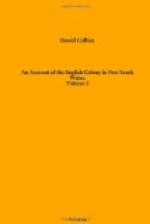In the beginning of this month, the settlers at the Hawkesbury sent round some grain, in part payment of the debts which were due from them to government for the seed which had been lent them last year to crop their grounds.
In consequence of complaints which were laid before the governor, relative to some exorbitant demands made by the public bakers upon those who had occasion to employ them, and of the impositions practised as well in the quality as in the quantity of the bread returned in lieu of the flour or grain delivered to them, the judge-advocate and two other magistrates were directed to hold a meeting for the purpose of enquiring into the business, as well as for examining and regulating the weights and measures which were at present in use in the colony. An order was at the same time issued, recommending to the settlers of every district, that, as much pains had been taken to establish, agreeably to their wishes, the rate of wages to be paid for all kinds of labour, they should now attend strictly to this regulation, and no longer suffer themselves to be imposed upon. There were strong reasons for suspecting that, notwithstanding the bond which they had entered into, rigidly to adhere to the regulations which had been established for their benefit, some among them were so very deficient of even honest principles as to attempt by various means to evade the regulation, to the great injury of other more industrious and more deserving men. In order the more readily to detect a practice so shameful and iniquitous, the governor judged it requisite to hold out a reward to those who would come forward and give such information as should be sufficient to prove the offence, by offering one-third of the sum forfeited to the informer. The settlers were also called upon to give information of any labouring man who, on offering himself for hire, should refuse to accept the regulated wages. As such person must be incapable of living in this country without work, he was immediately to be apprehended as a vagrant, who, having no visible means of providing honestly for his support, must have recourse to robbery.
The natives at the Hawkesbury were at this time very troublesome, burning a dwelling-house and a stack of wheat belonging to a settler there, after having plundered him of all his other possessions.
On the 21st, as much wheat as the public granaries at Sydney, Parramatta, and the Hawkesbury could contain, having been received, they were closed until the month of August next.
Towards the latter end of the month, the governor, accompanied by some gentlemen of the settlement, set off from Parramatta, on an excursion, in which he meant to obtain some knowledge of the ground between Duck river and George’s river, with respect both to its quality and quantity. This tract was walked over, and much excellent land was found well provided with fresh water in chains of large deep ponds. On this ground some of the marine soldiers, who had enlisted for three years in the New South Wales corps, having completed their service, were desirous of being settled.




